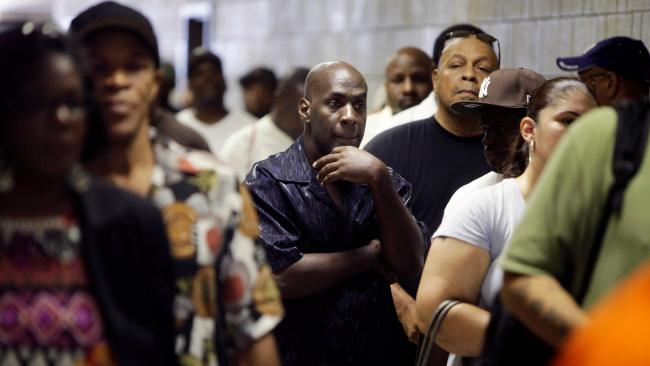(ThyBlackMan.com) Twenty trillion dollars is a lot of money. Absent a major course-correction or a sudden increase in economic growth, the US Federal debt will reach that level by 2017. Americans would consistently prefer to have Republicans, rather than Democrats address our fiscal issues, but there is a catch. The country will not trust the party to do what we do best so long as they fear what Republicans will do to the social safety net.
Republicans will not get the mandate we need to change this country’s fortunes until we can develop a convincing approach to dealing with plight of the less fortunate. A sound, convincing approach to poverty relief is the gateway to a Republican future and an American Renaissance.
Dealing with our mounting financial problems should not be difficult. America is fantastically wealthy, fully capable of generating surpluses or managing a much higher debt load. In fact, a modest, sustained increase in economic growth would allow us to bring the debt in line within a decade or so.
Our debt is not a problem in and of itself, but a symbol of something more dangerous. People and organizations successfully borrow money as a means to achieve a goal, but that is not what America has been doing since 2000 – the last year we experienced a surplus. The debt we are accumulating today isn’t buying us anything. It is the accumulated cost of political gridlock and a lack of vision.
2000 – the last year we experienced a surplus. The debt we are accumulating today isn’t buying us anything. It is the accumulated cost of political gridlock and a lack of vision.
The key to debt reduction is growth and our biggest single obstacle to growth is a sclerotic government structure which has failed to keep pace with changes in the economy and culture. Government remains slow, labor-intensive, and relatively unresponsive. Government is not only increasingly expensive, it is accomplishing less and less.
Tearing down government is not a solution. We need government to work.
The debt is just a symbol of our real political problems. Dodd-Frank, for example, was meant to curb the thinly veiled casino gambling of federally-insured financial institutions. Instead it has become a regulatory Potemkin village. Saddled with massive new bureaucratic burdens legitimate businesses struggle while the same derivative speculation that fueled the last crisis continues virtually unabated.
No Child Left Behind was so massively broad and clumsily crafted that it has devolved into little more than a bureaucratic dance. Almost every state in the union has either had the requirements waived or has a waiver pending. The goals of the law were admirable and might have actually worked in the mid-20th century. Today, such an ambitious effort at central planning is a ridiculous and painful joke.
Then there is the Affordable Care Act. Do we even need to address the ACA?
Government in the US does less for ordinary people than the dense bureaucracies of Western Europe, but it does it with the same levels of inefficiency, complexity and unaccountability. And that’s just the Federal picture. The problem is arguably much worse at the state and local level, where many government entities continue to exist for little practical purpose other than to collect taxes to pay under-funded pensions.
New technologies like Tesla and Uber offer enormous promise, but their growth is being thwarted by state and local governments shackled by their political ties to incumbent businesses and unions. The same combination of cronyism over-enthusiastic regulation is strangling the growth of solar power. As heavy as our Federal government may be, it is less of a burden on our economy than our thousands of city councils, state legislatures, and county boards.
Democrats, with their deeply entrenched ties to organized labor are institutionally incapable of leading the country toward the leaner, smarter government institutions we need in order to operate in a more dynamic world. Americans look to Republicans to make tough decisions on government reform, but they legitimately fear what we might do.
Welfare, Medicare, Social Security and the rest of our social insurance network has been the buffer that makes our financial dynamism possible. A deteriorating long-term debt picture and a bureaucratic quagmire may be concerns, but they are far less worrying than the possibility of seeing the entire structure of the safety net destroyed.
If Republicans could develop a reality-based, sensible approach to the social safety net it would alleviate most of the concerns that prevent the party from being trusted. An intelligent approach to poverty relief might be the key that unlocks a Republican future.
Developing a realistic agenda around poverty issues is going to be very difficult. Safety net policies expose the blind spots in most Republicans’ understanding of the world. They touch on questions of race, justice, and institutional inequality which most Republicans patently refuse to acknowledge. Dealing with the social safety net requires us to confront realities about the shape of the world that undermine deeply cherished myths.
The good news is that there are options available, developed by economists and thinkers on the right, which would allow us to replace our old approach to the social safety net while reducing the size and role of government. The bad news is that the party is so mired in paranoia and delusion that it is virtually impossible for anyone to propose realistic reforms of almost any kind without being forced to the political margins. A political party that can be deluded by Cliven Bundy or Ted Cruz is in no fit shape to be trusted with important matters.
Republicans, as the challengers to the established bureaucratic order, have an unusual burden to demonstrate that our goals can be accomplished without tearing down the other pillars of the Republic. We should be able to do that, but Fox News and AM radio aren’t going to help. People used to trust Republicans in part because they were boring. The GOP today is relentlessly exciting in the worst possible ways.
Restoring some sense of sanity and realism is going to be a painful challenge. Before we can once again with a Reagan-style mandate, we will have to win the country’s trust on the issue that has been our Achilles heel.
If it were easy we would have done it already.
Staff Writer; Chris Ladd
For more thought provoking articles visit; HipHopRepublican.com.
Also connect with them via twitter; http://twitter.com/HHR

















Leave a Reply